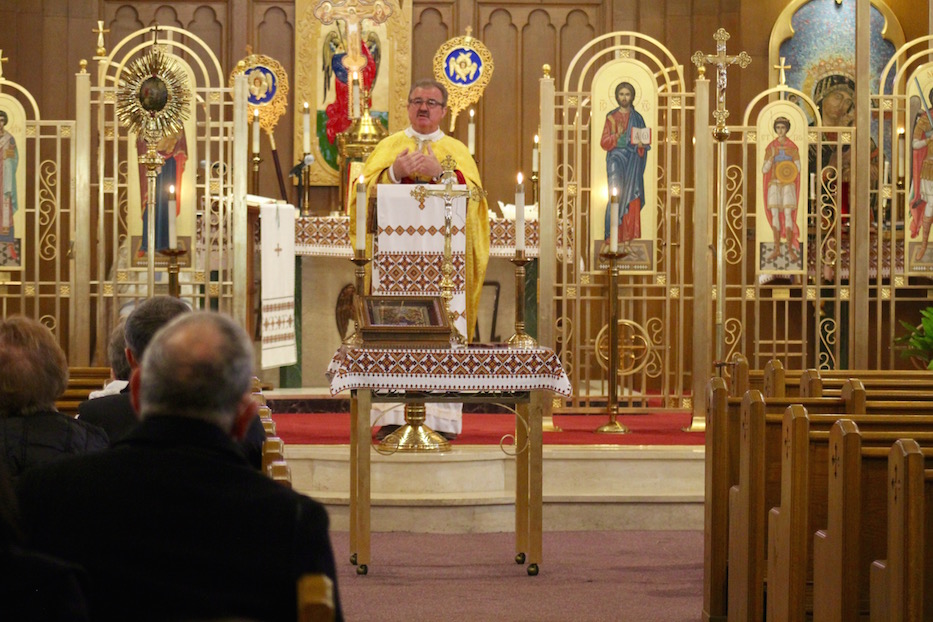Saints Andrew Kim Taegon, Priest, and Paul Chong Hasang, and their Companions, Martyrs on Tuesday of week 25 in Ordinary Time  St. Michael the Archangel Ukrainian Catholic Church, Baltimore Readings at MassLiturgical Colour: Red. Year: C(II). These are the readings for the feria
On wickedness and virtueLike flowing water is the heart of the king in the hand of the Lord, who turns it where he pleases. A man’s conduct may strike him as upright, the Lord, however, weighs the heart. To act virtuously and with justice is more pleasing to the Lord than sacrifice. Haughty eye, proud heart, lamp of the wicked, nothing but sin. The hardworking man is thoughtful, and all is gain; too much haste, and all that comes of it is want. To make a fortune with the help of a lying tongue, such the idle fantasy of those who look for death. The wicked man’s soul is intent on evil, he looks on his neighbour with dislike. When a mocker is punished, the ignorant man grows wiser, when a wise man is instructed he acquires more knowledge. The Just One watches the house of the wicked: he hurls the wicked to destruction. He who shuts his ear to the poor man’s cry shall himself plead and not be heard.
Guide me, Lord, in the path of your commands. They are happy whose life is blameless, who follow God’s law! Make me grasp the way of your precepts and I will muse on your wonders. Guide me, Lord, in the path of your commands. I have chosen the way of truth with your decrees before me. Train me to observe your law, to keep it with my heart. Guide me, Lord, in the path of your commands. Guide me in the path of your commands; for there is my delight. I shall always keep your law for ever and ever. Guide me, Lord, in the path of your commands.
Alleluia, alleluia! My soul is waiting for the Lord, I count on his word. Alleluia!
Alleluia, alleluia! Happy are those who hear the word of God and keep it. Alleluia!
'My mother and my brothers are those who hear the word of God'The mother and the brothers of Jesus came looking for him, but they could not get to him because of the crowd. He was told, ‘Your mother and brothers are standing outside and want to see you.’ But he said in answer, ‘My mother and my brothers are those who hear the word of God and put it into practice.’ These are the readings for the memorial
The souls of the virtuous are in the hands of GodThe souls of the virtuous are in the hands of God, no torment shall ever touch them. In the eyes of the unwise, they did appear to die, their going looked like a disaster, their leaving us, like annihilation; but they are in peace. If they experienced punishment as men see it, their hope was rich with immortality; slight was their affliction, great will their blessings be. God has put them to the test and proved them worthy to be with him; he has tested them like gold in a furnace, and accepted them as a holocaust. When the time comes for his visitation they will shine out; as sparks run through the stubble, so will they. They shall judge nations, rule over peoples, and the Lord will be their king for ever. They who trust in him will understand the truth, those who are faithful will live with him in love; for grace and mercy await those he has chosen.
Those who are sowing in tears will sing when they reap. When the Lord delivered Zion from bondage, it seemed like a dream. Then was our mouth filled with laughter, on our lips there were songs. Those who are sowing in tears will sing when they reap. The heathens themselves said: ‘What marvels the Lord worked for them!’ What marvels the Lord worked for us! Indeed we were glad. Those who are sowing in tears will sing when they reap. Deliver us, O Lord, from our bondage as streams in dry land. Those who are sowing in tears will sing when they reap. Those who are sowing in tears will sing when they reap. They go out, they go out, full of tears, carrying seed for the sowing: they come back, they come back, full of song, carrying their sheaves. Those who are sowing in tears will sing when they reap.
Alleluia, alleluia! It is a blessing for you when they insult you for bearing the name of Christ, for the Spirit of God rests on you. Alleluia!
The Son of Man is destined to suffer grievouslyJesus said: ‘If anyone wants to be a follower of mine, let him renounce himself and take up his cross every day and follow me. For anyone who wants to save his life will lose it; but anyone who loses his life for my sake, that man will save it. What gain, then, is it for a man to have won the whole world and to have lost or ruined his very self? For if anyone is ashamed of me and of my words, of him the Son of Man will be ashamed when he comes in his own glory and in the glory of the Father and the holy angels.’ The readings on this page are from the Jerusalem Bible, which is used at Mass in most of the English-speaking world. The New American Bible readings, which are used at Mass in the United States, are available in the Universalis apps, programs and downloads. |




